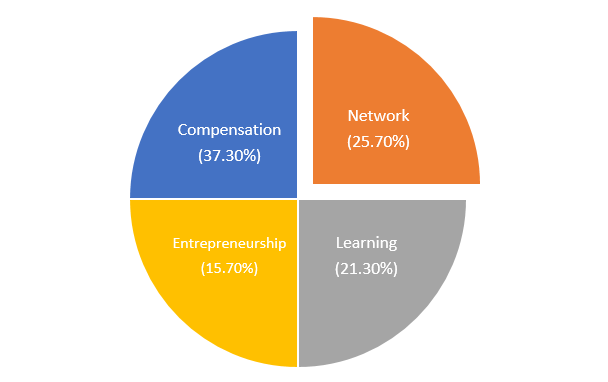Bloomberg Business Ranking Methodology

Bloomberg Business Week MBA rankings are considered as one of the most trusted ranking providers for business schools and MBA programs. Ranking publications are extensively used by students for selecting colleges. Bloomberg Businessweek's MBA rankings are even more authentic as it surveys directly to MBA grads and asks them about their study experience and companies about the professionals they hire from MBA schools. Bloomberg's first list of best B-schools was out in 1988. However, in 2019-20 they have changed their ranking methodology. Bloomberg provides two separate ranking lists for full-time MBA programs annually. One list is for US schools and the other for global schools. It uses the same methodology for both rankings.
Ranking providers use a different methodology to derive their respective rankings. In this article, we will explain to you the methodology adopted by the distinguished ranking provider Bloomberg Business Week. Ranking indicators can be the same many times, however, there can be different indicators for getting rankings for business schools. The Bloomberg Ranking methodology involves four different indicators namely Compensation, Entrepreneurship, Learning, and Network. Whenever one thinks about pursuing an MBA abroad, the first thing that strikes is the return on investment (ROI). Bloomberg gives the highest weightage to compensation while calculating its B-schools rankings.
Compensation: This is one of the most important indicators that decide the ranking of business schools. It evaluates factors like pay packages of MBA grads right after graduation, the percentage of MBA students employed three months after completing their graduation. Many students consider this factor before making a decision while selecting a college. So, this can help them in finalizing the right college.
Predict your IELTS, TOEFL, and PTE in just 4 steps!
Network: This is an important indicator for students planning to go to a business school. The factors that play a role here are the quality of networks built by students; this can be among themselves, as the quality of their interactions can play a major role in giving a good opportunity to MBA graduates. It also considers the brand value of the B-school among recruiters.
Learning: Although some students may not consider this indicator a major one, but this is a very important indicator that evaluates the learning outcomes of the study program. Through this indicator, one learns whether the curriculum of a B-school is applicable in the real world and how much it is liked by the corporate world. Also, some other key factors are considered while getting the Learning outcome. It considers the amount of emphasis the curriculum gives on imparting skills like problem-solving, strategic thinking, and innovation. Class size and collaboration are also some of the factors that Bloomberg considers while analyzing the Learning outcome.
Entrepreneurship: While analysing the Entrepreneurship index, Bloomberg considers whether the study program offers entrepreneurship training, quality of entrepreneurship training, and recruiters’ opinion on entrepreneurship skills of MBA grads.
Business schools Bloomberg includes in its rankings
Bloomberg has also set a minimum threshold for survey responses, those schools based on the school's alumni and graduating classes. Those schools that do not meet the criteria set by Bloomberg were not included in its rankings list. The number of programs analysed every year may vary.
Influence of Bloomberg's business rankings
According to GMAC, 32% of candidates in the US and 30% in Latin America frequently used Bloomberg's ranking.
Rankings play an important part for candidates in selecting a B-school. So, candidates looking for factors like salaries after completing their graduation, learning outcomes and networking can consider Bloomberg BusinessWeek's MBA rankings.
Also Read


